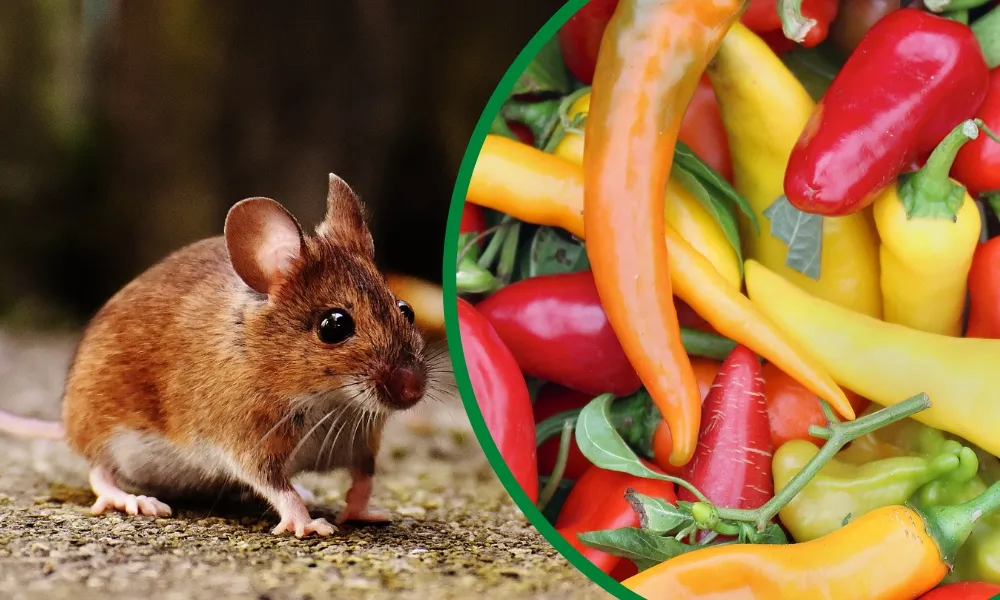Although I find spicy food delicious, it’s not easy to handle its hotness. This makes me wonder if little creatures like mice eat spicy food too.
Here’s what I found out:
Yes, mice can consume spicy food. Surprised?
Capsaicin or capsaicinoids are responsible for the hotness of spicy substances like chilies. Capsaicin receptors are absent from mouse body cells.
As a result, they do not experience much burning after eating something spicy.
Exposure to spicy or peppery food may put them off for a while. However, they quickly adjust to it.
You are now aware that mice can consume hot foods. But how do they consume something that hot?
Table of Contents
Why Can Mice Eat The Spiciest Food?
Peppers and chilies have a compound called capsaicin. To understand why mice can eat hot food, it is important to understand how capsaicin affects the human body.
Capsaicin causes the spiciness of chili. The human body contains pain receptors. It causes a burning feeling by activating these receptors.
Actually, capsaicin causes the same kind of sensation that a heat sense would.
It attaches to mammals’ heat-detecting nerves. These are referred to as the VR1 nerves. It activates the VR1 neurons. Mice VR1 receptors are distinct from human VR1 receptors.
Therefore, a mouse’s VR1 still allows the nerve to react to heat, but it is resistant to capsaicin. As a result, mice are unaffected by capsaicin.
Human mouths can catch fire when eating hot peppers. However, it doesn’t seem to have any impact on the mice.
Fun Fact:
Do you know mice can also eat Carolina Reaper, the spiciest pepper in the world?
What do you think happens to a mouse when it eats spicy food?
What Happens If A Mouse Eats Spicy Food?
Although the neurotic nature of mice prevents them from being affected by spicy food, it can harm the mucous membranes and eyes of mice.
Their stomach might also get affected by it, resulting in gastral and digestive issues.
Peppers can increase signaling in 2 neurons in mice – a dopamine-producing one and a serotonin-producing one.
It has been shown that mice expressing the receptor for dopamine respond to capsaicin by becoming less hungry and more active.
This is in line with the known effects of dopamine. Capsaicin causes more anxiety in mice that express the receptor in serotonin-producing neurons.
However, the issue of whether or not to provide spicy food to mice is up for debate. It is advised to use moderate amounts of spices and hot peppers when feeding them.
They should not be given really spicy peppers that hurt when handled.
The mice can eat spicy food, so what kind of spices do they eat?
Types of Spicy Food That Mice Can Eat

Mice will consume nearly anything. They can even nibble on non-edible materials, including paper, wires, fabric, and cardboard.
According to some studies, mice lack the cells required to respond to capsaicin. However, some argue that mice should not eat spicy food as it is not good for their health.
If we go by the idea that mice can eat spicy food, then they can eat any spice. Some of them include
- Cumin
- Basil
- Coriander powder
- Turmeric
These spices can be fed to mice. Though it is debatable whether mice should be fed spicy food or not, try to give them mild spices. Be sure to feed them spicy food only if they want it. Use only a small amount of mild spices.
There are some spices that mice do not enjoy, such as cayenne pepper, cinnamon, and clove.
But this claim lacks scientific evidence. A mouse can eat anything spicy.
How Frequent Can Mice Eat Spicy Food?
If your mouse enjoys the spicy flavor, feeding spicy food in little portions is okay. Just try not to give them as much as possible.
Peppers provide many nutritional benefits. They include lots of antioxidants and vitamins. They are beneficial to a mouse.
So, although not often, mice can be fed spicy food. Keep in mind that excesses might be dangerous.
All mice might not favor the spicy flavor. It is comparable to ours. While some people enjoy spicy food, not all people do.
Consult a veterinarian about how much spice should be given to a pet mouse.
Do Mice Like Chilli?

Mice supposedly dislike chilies. However, science does not support this claim. Chilies are sometimes used as a rodent repellent. Chilies contain capsaicin.
Capsaicin irritates eyes and mucous membranes. It is therefore thought that chilies might irritate a mouse. It is unclear if mice can directly consume chili, though they can eat hot food.
In fact, a mouse can usually nibble on practically anything. Mice eat everything, with the exception of a few substances that make them toxic.
But they will stay away from flavors that they do not enjoy. They can adapt well, though. Even if mice do not enjoy spicy flavors at first, they will eventually adapt to them.
What Spice Do Mice Hate?
Mice appear to dislike 4 types of spices. These spices are also used to prevent mice. There are no scientific studies that prove these repellents work.
However, many claims that these spices keep mice away.
- Cinnamon
- Peppermint oil
- Clove
- Cayenne Pepper
According to what we now know, the last one appears to be an exception.
As we all know mice can eat spicy food. The fragrance of cayenne pepper, however, is reportedly unpleasant to mice.
Final Thoughts
In this article, we learned that mice can eat spicy food. Mice’s VR1 receptors are capsaicin resistant.
Because of their genetic makeup, they are not affected by the heat and spiciness of pepper and chilies.
However, mice should only be given small amounts of spicy food.
The ideal strategy is to gradually introduce your mouse to a small amount of spicy food. Find out whether it likes spicy food.
If you think your pet enjoys it, you could slightly increase the serving size. It is best to stop giving the mouse spicy food if it dislikes it.
Feel free to share this blog with your friends if you find it interesting!
